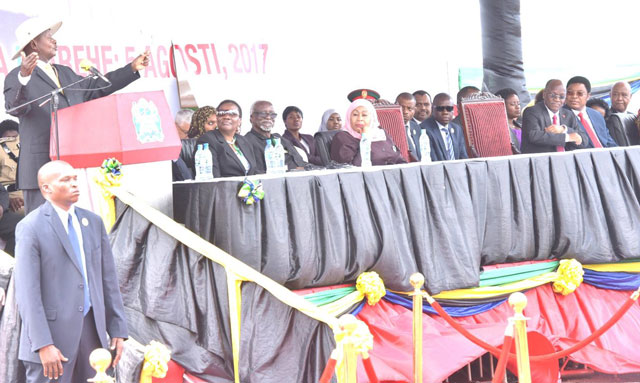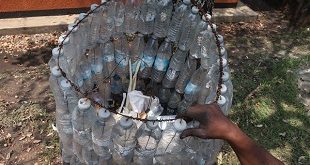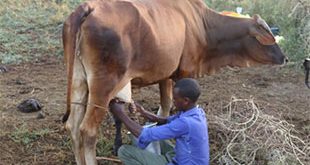
Museveni, however, said whereas natural resources are important for generation of wealth, the greatest resource to the region are her people who consume and produce goods and service.
“These natural resources are important but more important for us are the people. The 170 million East Africans because they consume and produce,” he said. “They are producers of goods and services and will do well once we harmonise. They help us negotiate credibly with bigger markets and are resourceful in the forward thrust of these economies.”
The President added: “At this stage, East Africa and certainly Uganda are unstoppable. We have everything.nothing will stop us from growth, development and transformation. No peasants should produce other peasants. Peasants should produce educated people.”
President Museveni also noted integration was also important for strategic security and reminded the people that Africans have for 500 years suffered evils such as slave trade, colonialism, epidemics, war, neo-colonialism among others because they could not guarantee their strategic security.
“Political fragmentation aided these calamities. Europeans came as explorers and ended up as colonisers as our chiefs watched or aided them,” said Mr Museveni. “Our Independence leaders (Nkrumah, Madibo, Nyerere) guided us correctly. Economic integration alone is not enough. Political federation is the therapy for our very survival. Since the 1960s, I have been their disciple.”
He noted that in the Second World War, highly developed but small states were the first victims of Hitler and it took the intervention of mighty countries like USA and Russia to stop Hitler.
“Where is the insurance of the African continent, where is it’s gravity in case of anything? The East African leaders of today need to find the answer,” he stressed.
Museveni salutes Nyerere
Museveni saluted the late Tanzanian President Mwalimu Julius Nyerere for the support he rendered to the people of Uganda and other African countries during their struggle for self-determination and other liberation struggles.
Museveni equally saluted the private partners in the oil pipe line project (Total, CNOOC and Tullow) and assured them that with the right working relationship, they will together end in a win-win situation.
About Tanga, the city where the pipeline ends, Museveni said it had a historic significance to Uganda.
“In 1972, the Kikosi Maluum under Obote landed here in Tanga from Sudan before moving to Handane to set up base. I also smuggled 14 guns to Kampala through Horo Horo, which is near here during our Liberation struggle,” he told the cheering crowd.
Magufuli’s Remarks
On his part, President Magufuli thanked President Museveni and his government for trusting Tanzania and choosing the Tanga route for the project despite the other options available.
He said it was a vote of confidence to the Tanzanian people. He said that Tanzania had to sacrifice by offering several concessions to Uganda just like it did in struggle against dictatorship but said that Tanzania was certain they will greatly benefit from the pipe line project.
“This pipeline could have gone to a shorter route of 900kms but Museveni has supported us. We had to make concessions for our Ugandan brothers like we have previously done to liberate them,” he said.
“We had to sacrifice but we shall also benefit. During construction, direct jobs will be between 10,000 to 15,000 while temporary ones will peak to 30,000. Already hotels are benefiting as guests come here and we shall set up a cement factory here, one of the biggest in East Africa,” said Magufuli.
He said with the oil coming to Tanga, Tanzania would now buy crude oil from Uganda instead of incurring high exports of importing from the Arab world, while indicating that Uganda would also find it cost-effective selling to Tanzania.
Magufuli added that Tanzania also sought to gain from the skills and expertise of Ugandan technocrats who had built experience in the extractives sector.
“Oil was discovered by Ugandan experts. They have done it. They will come to Tanzania to check our hydrocarbons in Tanganyike—where there are traces of oil. If we find it, they will bring their skills to Tanzania,” he said amidst applause from the excited crowd.
The Tanzanian President warned speculators who are rushing to set up houses in the pipeline path, saying the government already has satellite images, including already existing property. He warned that only those with bonafide claims would be compensated while speculators will walk away empty-handed.
He challenged the contractors to ensure they complete the project on time, saying anything short of that would be a big blemish on their profiles and countries of origin.
The function was attended by Tanzanian Vice President Samia Suluhu, the Prime Minister Kassim Majaliwa and the Tanzanian First Lady Janet Magufuli.
On the Ugandan side were 1st Deputy Prime Minister and Minister for East African affairs Kirunda Kivejinja, the Energy and Mineral development Minister Irene Muloni, the Finance Minister Matia Kasaijja and the State Minister for Bunyoro Affairs Ernest Kiiza among others.
QUICK FACTS ABOUT EAST AFRICA CRUDE OIL PIPELINE
– At 1,445kms, it will be the longest electrically-heated oil pipeline in the world.
– Uganda will host 296kms of the pipeline, while the remaining 1,149kms will be in Tanzania.
– In Uganda, the pipeline will run through eight districts and 24 sub-counties. In Tanzania, it will go through eight regions and 24 districts.
– It will be a buried pipeline, with 1.2 metres of it beneath the ground.
– Its estimated cost is $3.55 billion while constriction should last three years.
– It will have a daily flow rate of 216,000 barrels with six pumping stations and two pressure reduction stations.
 The Independent Uganda: You get the Truth we Pay the Price
The Independent Uganda: You get the Truth we Pay the Price




Let them conive together and eat Uganda oil while ugandans a dieng of hunger, poverty and diseases
Where has that come from?